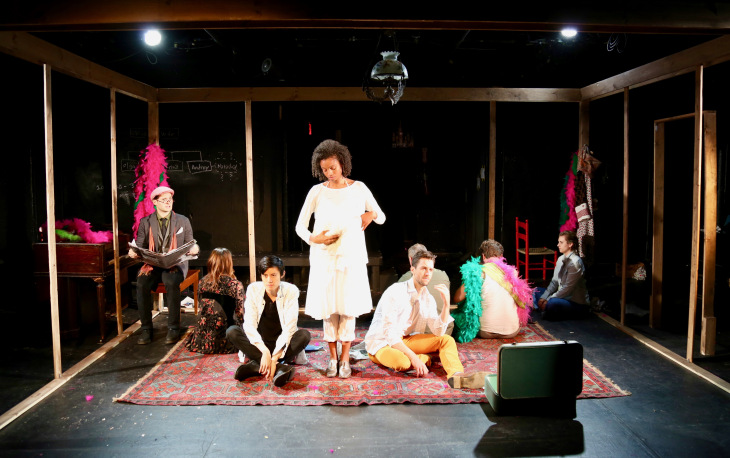This is the first installment in Alli Cruz’s new Arts & Life column, New York Minute, discussing her experiences with theater and art while studying with the Stanford in New York program.
This play starts with a boom. You could call it a big bang. It’s a recreation, a rebirth of the modern classic: Chekhov’s “The Three Sisters.” And while some adapted plays can be reductive or trifling, “TaRaRaBOOM” is anything but. Performed by CRASH Theater Co., a small theater collective in NYC focused on moving beyond the parameters of traditionalism, this adaptation is refreshing and remarkably accessible in terms of modern language usage and contemporary political relevance.
CRASH Theater Co.’s “TaRaRaBOOM: A Three Sisters MishMash” follows Chekhov’s story of “The Three Sisters” – Olga, Masha and Irina – in the aftermath of their father’s death, searching for meaning, connection and, perhaps most of all, happiness. The play begins on Irina’s 20th birthday (which is also the one-year anniversary of their father’s death), wherein each sister speculates on the cause of their unhappiness – life without a father, an unhappy marriage, lack of work and therefore of purpose.
It becomes increasingly clear that each character in the show, from the sisters to their brother to the army officials filtering in and out of the house, is dealing with their own personal discontent; and yet, they have one thing in common – their desire to return to, to find fulfillment in, their almost-dreamlike symbol of happiness: Moscow. Left to grieve and cope in their small provincial town, the three sisters and company search for the lofty ideal of happiness through physical means – an affair, work life, murder, etc.
I feel as though the strength of this adaptation lies in the ways in which it underscores perceived happiness and unhappiness in adult life. I’ve only recently read Chekhov’s original “The Three Sisters” script, but I am struck by how well-attuned CRASH Theater Co.’s production is to the ways in which adulthood renders the characters bereft of – or at the very least, struggling for – profound meaning. I find this search for meaning especially poignant after such profound loss; specifically, in this case, the sisters’ loss of their father.
To me, these ideas of searching and losing and finding oneself comes across especially well through the ensemble work and stage pictures of the show. In one of Masha’s lover Vershinin’s many monologues, in which he philosophizes about human happiness and the unknowability of future progress, the bluish-white lights dim as the cast moves about him in droves, waving their arms as if demonstrating the fluidity of time and knowledge – specifically the ways in which knowledge is shaped by time, and the ways in which knowledge seems to change over time. What people know to be true now may be accepted as incorrect or incredibly problematic in a few decades time, and this notion can fill the mind with a sort of existential dread — What, if anything, is truly knowable? Perhaps this idea of overwhelming and dread is also laden within that variable, movement-heavy scene.
I also find it particularly interesting that, towards the beginning of the show, every time a character mentions even Moscow, the cast collectively turns to the audience and shouts “Moscow!” while varicolored lights brighten around the stage. This aside underscores the happiness and hope that these characters thrust upon a singular place, or at least the idea of a place, and the absurdism inherent within this immense and generally unfounded excitement is all at once comical and lighthearted.
This play is fun because it is absurd, because it picks apart the ways in which we are absurd. One character, Chebutykin, asks repeatedly, “What difference does it make anyway?” – a question that the audience must grapple with throughout the show as tragedy and triviality unfold.
I particularly enjoy the actors’ engagement with the audience during darker moments of the play, as it encourages us as spectators to contemplate the absurdity and meaning (or the lack thereof) in our own lives; for instance, the actors choose an audience member to deliver the news of Tuzenbach’s death via cue cards. In another scene, Masha’s husband pleads and cries to a different audience member, asking if anyone, anyone at all, knows where his wife is.
Other comedic moments, such as the scene wherein Tuzenbach attempts to create a new song (one that just ends up sounding like a vast array of other pop songs), highlight the seeming futility of human creation, posing the questions: What is originality? What is individualism? How does the individual carve their own original sense of happiness via the work they do and the space they inhabit? This perhaps has a sort of meta-feel to it, as this work itself is not entirely “original,” but rather an adaptation of a classic.
Other notable scenes include Vershinin’s final exit, which leaves Masha heartbroken, as he walks out the wooden frame door and runs his hands slowly across a black wall, which is chalked with information, just off stage right. As he slowly and methodically blurs the words, the information, we understand the ways in which loss blurs meaning, how it clouds the information we think we know. His exit is slow and mesmerizing – perhaps also capturing the ways in which we can sometimes romanticize the people who leave us.
Overall, I find this production to be witty, engaging and most importantly, enjoyable. This show is weird and wacky in the most thought-provoking of ways.
Contact Alli Cruz at allicruz ‘at’ stanford.edu.
